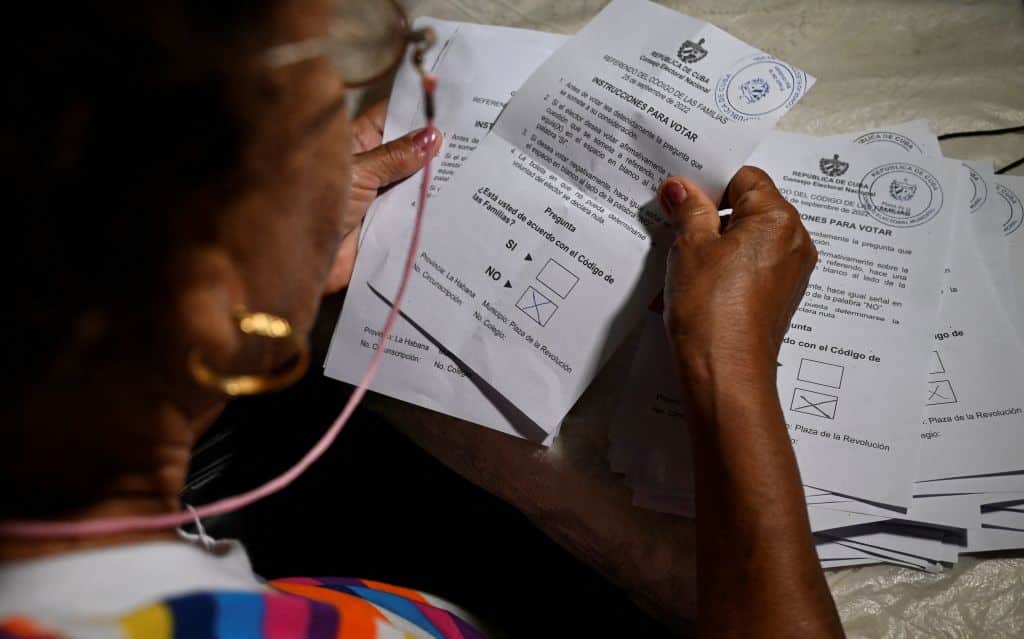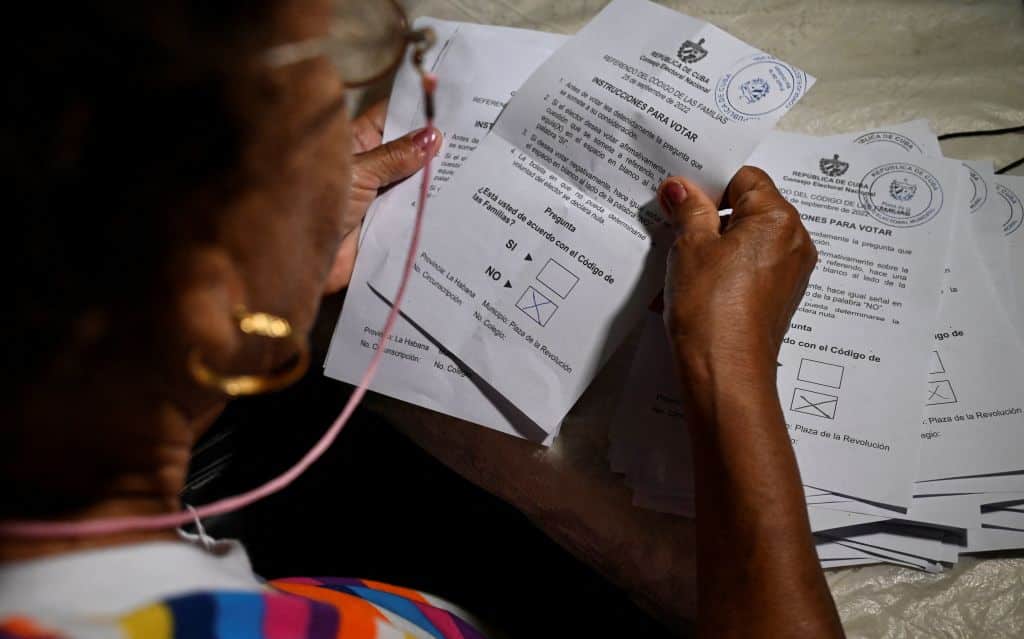In a referendum last Sunday in Cuba, voters approved same-sex marriage and adoption in overwhelming numbers. Although the Catholic Church has been suppressed in the communist country, Catholicism is still the majority religion and continues to exert significant influence.
In all, just under 67 per cent voted in favour on a turnout of nearly 75 per cent. The 100-page ‘family code’ legalises same-sex marriage and unions, allows same-sex couples to adopt children, and promotes equal sharing of domestic rights and responsibilities between men and women.
President Miguel Díaz-Canel had said he expected most of the population to vote yes, and that the new code reflected the diversity of people, families, and beliefs within the country. The reforms were also the culmination of efforts by gay rights activists, with huge social attitude changes having taken place.
In the early days of communist rule, gay men and lesbians were sent to work camps for supposed ‘re-education’. This then marks a significant turnaround. So far, there has been no word from the Vatican but the vote could be seen as a sign of the decline of the Church’s influence in the communist country.
The Catholic Church is witnessing a steady decline across Latin America, despite having its first Latin American leader. This appears to be, in no small part, thanks to the Church’s greater emphasis on social justice over moral values, opening the door to Evangelical Protestantism instead.
Currently, just under 40 per cent of the world’s Catholics live in Latin America. But for many Latin Americans, the historic leftism of the region – as well as a growing racial awareness and a more secular outlook – has upended generations of Catholic adherence.
In the last few years, both Argentina and Mexico have legalised abortion, although abortions remain illegal in Brazil except in cases of rape or if pregnancy poses a risk to the mother’s life. Same-sex marriage is also recognised in Argentina (2010), Brazil (2013), Chile (2022), and now Cuba.
According to data from Latinobarómetro – and as reported by Axios - between 2010 and 2020, Brazil’s Catholic population fell from 66 per cent to 55 per cent. By some estimates, it will soon fall below 50 per cent. In Mexico, the figures for the same period were 83 per cent and 74 per cent.
Perhaps the most dramatic collapse has been in the Pope’s native Argentina, where the Catholic population crashed from 76 per cent in 2010 to 49 per cent in 2020. Catholics are also now a minority in Guatemala (41 per cent), El Salvador (39 per cent), and Uruguay (34 per cent).
While secularism and a sense of grievance at past abuses in the Church are factors in decline, a perceived failure – especially among poorer Latin Americans – to address social problems, not least related to law and order, may also have been key.
As such, cultural and national identification with the Church has been waning. Meanwhile, just as the number of Catholics across Latin America fell from 70 per cent to 57 per cent between 2010 and 2020, other Christian faiths sprang to life, in particular Evangelicalism.
In Brazil, the number of Evangelical Christians rose from 3 per cent in 2000, to 18 per cent in 2010, and 22 per cent in 2020 (some estimates put it nearer to 30 per cent). In Guatemala, the corresponding figures were 19 per cent, 34 per cent, and 41 per cent.
Meanwhile, the vote in Cuba signals yet more social change in Latin America. What a contrast with central and eastern Europe, where Hungary and Poland have recently tightened up abortion access, with traditionalist Catholicism roaring back to life in the region.
How Pope Francis interprets and analyses the Cuban referendum results will be closely watched.
In a referendum last Sunday in Cuba, voters approved same-sex marriage and adoption in overwhelming numbers. Although the Catholic Church has been suppressed in the communist country, Catholicism is still the majority religion and continues to exert significant influence.
In all, just under 67 per cent voted in favour on a turnout of nearly 75 per cent. The 100-page ‘family code’ legalises same-sex marriage and unions, allows same-sex couples to adopt children, and promotes equal sharing of domestic rights and responsibilities between men and women.
President Miguel Díaz-Canel had said he expected most of the population to vote yes, and that the new code reflected the diversity of people, families, and beliefs within the country. The reforms were also the culmination of efforts by gay rights activists, with huge social attitude changes having taken place.
In the early days of communist rule, gay men and lesbians were sent to work camps for supposed ‘re-education’. This then marks a significant turnaround. So far, there has been no word from the Vatican but the vote could be seen as a sign of the decline of the Church’s influence in the communist country.
The Catholic Church is <a href="https://catholicherald.co.uk/how-the-catholic-church-can-reverse-its-collapse-in-latin-america/">witnessing a steady decline across Latin America</a>, despite having its first Latin American leader. This appears to be, in no small part, thanks to the Church’s greater emphasis on social justice over moral values, opening the door to Evangelical Protestantism instead.
Currently, just under 40 per cent of the world’s Catholics live in Latin America. But for many Latin Americans, the historic leftism of the region – as well as a growing racial awareness and a more secular outlook – has upended generations of Catholic adherence.
In the last few years, both Argentina and Mexico have legalised abortion, although abortions remain illegal in Brazil except in cases of rape or if pregnancy poses a risk to the mother’s life. Same-sex marriage is also recognised in Argentina (2010), Brazil (2013), Chile (2022), and now Cuba.
According to <a href="https://www.axios.com/2022/04/28/catholic-decline-latin-america-evangelicals">data</a> from <em>Latinobarómetro</em> – and as reported by <em>Axios</em> - between 2010 and 2020, Brazil’s Catholic population fell from 66 per cent to 55 per cent. By some estimates, it will soon fall below 50 per cent. In Mexico, the figures for the same period were 83 per cent and 74 per cent.
Perhaps the most dramatic collapse has been in the Pope’s native Argentina, where the Catholic population crashed from 76 per cent in 2010 to 49 per cent in 2020. Catholics are also now a minority in Guatemala (41 per cent), El Salvador (39 per cent), and Uruguay (34 per cent).
While secularism and a sense of grievance at past abuses in the Church are factors in decline, a perceived failure – especially among poorer Latin Americans – to address social problems, not least related to law and order, may also have been key.
As such, cultural and national identification with the Church has been waning. Meanwhile, just as the number of Catholics across Latin America fell from 70 per cent to 57 per cent between 2010 and 2020, other Christian faiths sprang to life, in particular Evangelicalism.
In Brazil, the number of Evangelical Christians rose from 3 per cent in 2000, to 18 per cent in 2010, and 22 per cent in 2020 (some estimates put it nearer to 30 per cent). In Guatemala, the corresponding figures were 19 per cent, 34 per cent, and 41 per cent.
Meanwhile, the vote in Cuba signals yet more social change in Latin America. What a contrast with central and eastern Europe, where <a href="https://catholicherald.co.uk/cardinal-erdos-chance-of-succeeding-francis-may-be-strengthened-as-hungary-tightens-abortion-laws/">Hungary and Poland have recently tightened up abortion access</a>, with traditionalist Catholicism roaring back to life in the region.
How Pope Francis interprets and analyses the Cuban referendum results will be closely watched.


















